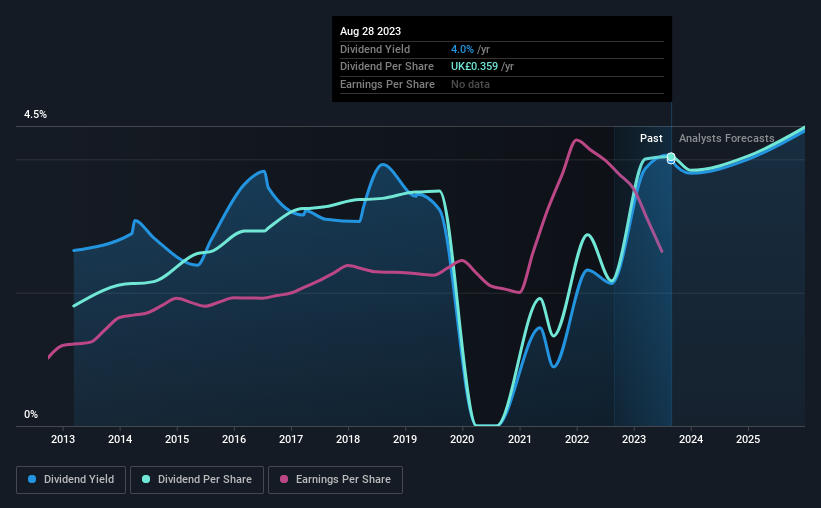Savills plc (LON:SVS) Will Pay A UK£0.069 Dividend In Two Days
Some investors rely on dividends for growing their wealth, and if you're one of those dividend sleuths, you might be intrigued to know that Savills plc (LON:SVS) is about to go ex-dividend in just 2 days. The ex-dividend date is one business day before the record date, which is the cut-off date for shareholders to be present on the company's books to be eligible for a dividend payment. The ex-dividend date is important as the process of settlement involves two full business days. So if you miss that date, you would not show up on the company's books on the record date. Thus, you can purchase Savills' shares before the 31st of August in order to receive the dividend, which the company will pay on the 2nd of October.
The company's next dividend payment will be UK£0.069 per share, and in the last 12 months, the company paid a total of UK£0.36 per share. Last year's total dividend payments show that Savills has a trailing yield of 4.0% on the current share price of £8.995. Dividends are a major contributor to investment returns for long term holders, but only if the dividend continues to be paid. As a result, readers should always check whether Savills has been able to grow its dividends, or if the dividend might be cut.
View our latest analysis for Savills
Dividends are typically paid out of company income, so if a company pays out more than it earned, its dividend is usually at a higher risk of being cut. That's why it's good to see Savills paying out a modest 32% of its earnings. A useful secondary check can be to evaluate whether Savills generated enough free cash flow to afford its dividend. It paid out an unsustainably high 205% of its free cash flow as dividends over the past 12 months, which is worrying. It's pretty hard to pay out more than you earn, so we wonder how Savills intends to continue funding this dividend, or if it could be forced to cut the payment.
While Savills's dividends were covered by the company's reported profits, cash is somewhat more important, so it's not great to see that the company didn't generate enough cash to pay its dividend. Were this to happen repeatedly, this would be a risk to Savills's ability to maintain its dividend.
Click here to see the company's payout ratio, plus analyst estimates of its future dividends.
Have Earnings And Dividends Been Growing?
Companies that aren't growing their earnings can still be valuable, but it is even more important to assess the sustainability of the dividend if it looks like the company will struggle to grow. If business enters a downturn and the dividend is cut, the company could see its value fall precipitously. It's not encouraging to see that Savills's earnings are effectively flat over the past five years. Better than seeing them fall off a cliff, for sure, but the best dividend stocks grow their earnings meaningfully over the long run. Earnings have been growing somewhat, but we're concerned dividend payments consumed most of the company's cash flow over the past year.
The main way most investors will assess a company's dividend prospects is by checking the historical rate of dividend growth. In the last 10 years, Savills has lifted its dividend by approximately 8.4% a year on average.
To Sum It Up
Is Savills worth buying for its dividend? Earnings per share have been effectively flat over this time, and Savills's paying out less than half its profits and 205% of its cash flow. Only rarely do we find companies paying out a low percentage of their profits yet a high percentage of their cash flow, so we'd mark this as a concern. Overall we're not hugely bearish on the stock, but there are likely better dividend investments out there.
If you want to look further into Savills, it's worth knowing the risks this business faces. For example - Savills has 2 warning signs we think you should be aware of.
Generally, we wouldn't recommend just buying the first dividend stock you see. Here's a curated list of interesting stocks that are strong dividend payers.
Have feedback on this article? Concerned about the content? Get in touch with us directly. Alternatively, email editorial-team (at) simplywallst.com.
This article by Simply Wall St is general in nature. We provide commentary based on historical data and analyst forecasts only using an unbiased methodology and our articles are not intended to be financial advice. It does not constitute a recommendation to buy or sell any stock, and does not take account of your objectives, or your financial situation. We aim to bring you long-term focused analysis driven by fundamental data. Note that our analysis may not factor in the latest price-sensitive company announcements or qualitative material. Simply Wall St has no position in any stocks mentioned.

